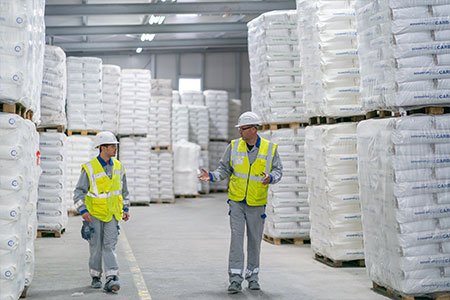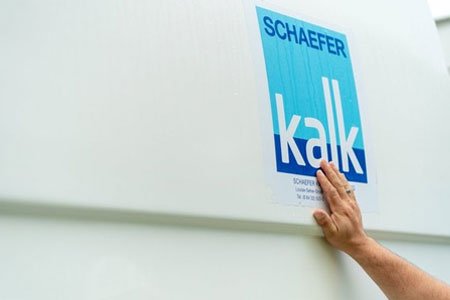Statement of policy on management systems and certified processes
Our guiding principles are to produce and supply top quality in a resource-saving manner, to accommodate the diverse desires of our customers, and to help them solve specific problems. We have decided to systematize and safeguard these activities by implementing the comprehensive standards specified in DIN EN ISO 9001 for quality management systems. Our compliance with these standards is regularly certified by an external auditor.
Our top products include a number of substances that are used as food additives or as precursors for food additives. Moreover, to satisfy the special hygienic requirements and to address and limit the relevant risks during production to the necessary extent, SCHAEFER KALK has introduced a supplementary HACCP concept in accordance with EC Regulation 852/2004, which is also subject to external monitoring and is integrated into our management system.
To verify that our HACCP-conform products also meet HALAL requirements, HALAL certification is regularly obtained in accordance with MS 1005:2009.
Some of our products are used as individual feed components in the animal feed industry. Consequently, SCHAEFER KALK complies with GMP+ Feed Certification Scheme requirements. Our compliance with feed safety requirements is independently monitored.
Health is our most valuable asset - no job is so important that it can be permitted to proceed under inadequate safety precautions. We therefore pledge to respect all important and necessary aspects of occupational health and safety and to comply with the corresponding requirements and laws. All our managers are responsible for protecting their staff from occupational accidents or health risks and exemplify this in their daily work. In integrating occupational health and safety into our organization, we have incorporated the standards specified in DIN ISO 45001 into the process-oriented structure of our management systems. Regular external monitoring ensures the effectiveness of this approach.
We make our products with minimal impact on nature, climate and the environment. To help us continuously reduce the impact of our production processes on nature, climate and the environment, we have established an internal environmental management system based on DIN EN ISO 14001 and integrated it into our quality management system. We have also established an energy management system in accordance with the DIN EN ISO 50001 standard. Decarbonization is an important aspect of our sustainable energy, climate and environmental policy.
In order to provide innovative products for medical technology applications, SCHAEFER KALK is certified according to DIN EN ISO 13485 Medical Products - Quality Management Systems. Such products are manufactured under clean room conditions following EU "Good Manufacturing Practice" guidelines. We have integrated this into our management system as well.
The strategy for safeguarding and continuing to develop the company and its markets is devised by the management board together with the divisional managers. The cooperative management model described in the integrated management system involves all our employees. The ongoing development of our products and product quality grades is discussed in regular meetings. Discussions on associated customer requirements, on necessary resource utilization and on agreed goals are further elements of these rounds. All legally relevant requirements and statutory obligations are complied with and regularly monitored.
Our decisions are made from a sustainable point of view, which we take to entail economic as well as social and environmental responsibility.
Our digital procedures and processes manual, which our employees have unrestricted access to, covers all the organizational measures we use to achieve our goals.
Management representatives are appointed for the individual application fields within the management systems. They coordinate their implementation and maintenance at all our sites. They also initiate internal audits at regular intervals and inform management about the current state of affairs.
The effectiveness of all the management systems is subject to ongoing review and evaluation. In this way, we are able to ensure continuous improvement and ongoing development. Planning and controlling make sure that measures decided upon are also implemented under the best possible economic conditions.
We obligate our employees to comply with our management systems and encourage them to contribute to continuous improvement.





